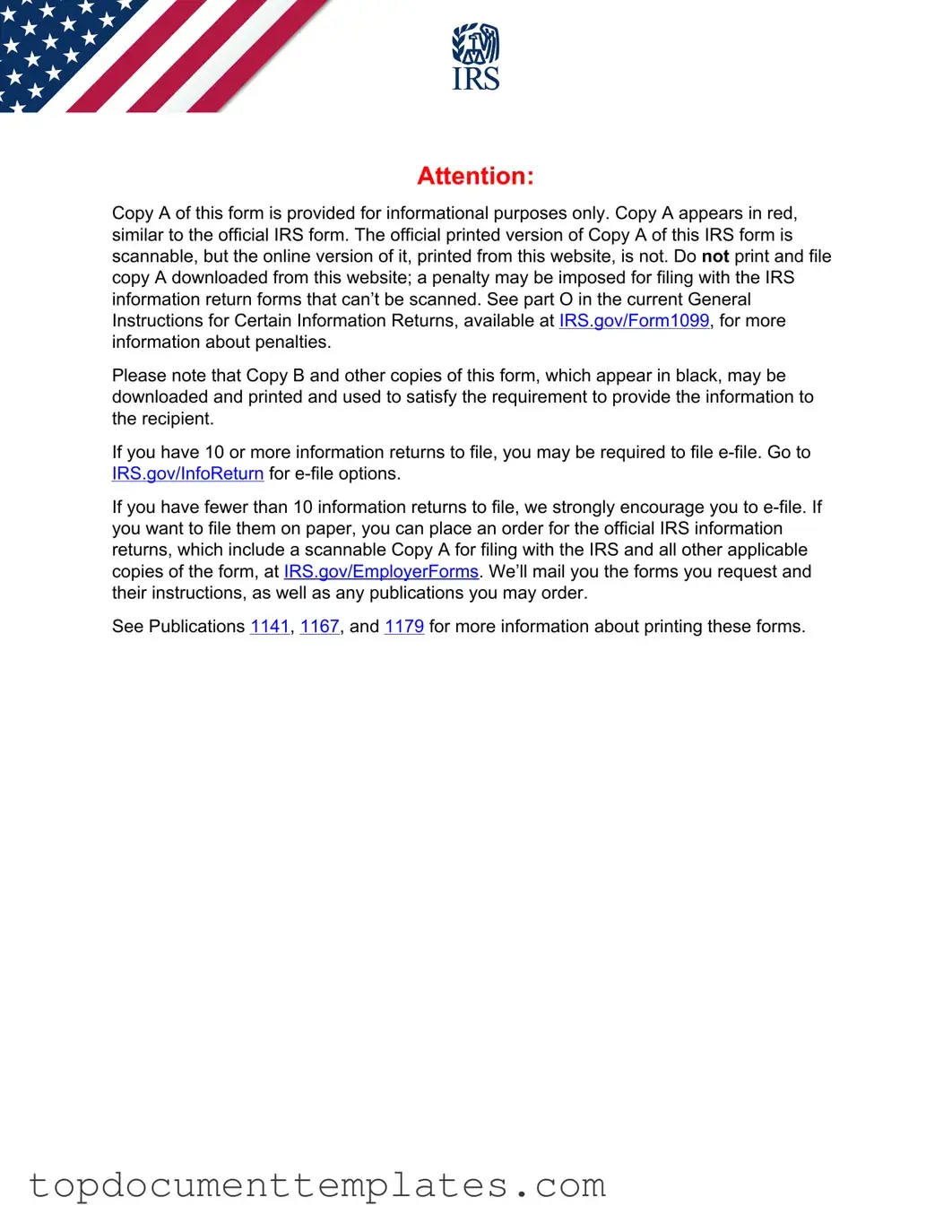Blank IRS 1099-MISC PDF Form
The IRS 1099-MISC form plays a crucial role in the world of taxes, particularly for those who are self-employed or who earn income outside of traditional employment. This form is primarily used to report various types of income that do not fall under the standard W-2 wage reporting. Freelancers, independent contractors, and businesses often find themselves using this form to report payments made to them, especially if they received $600 or more from a single payer during the tax year. In addition to reporting income, the 1099-MISC is also utilized for other purposes, such as reporting payments for rent, royalties, and certain types of legal settlements. Understanding the nuances of this form is essential, as it helps ensure compliance with tax regulations and aids in accurate income reporting. As the tax season approaches, knowing how to properly fill out and file the 1099-MISC can save individuals and businesses from potential penalties and audits, making it a vital component of financial management for many. Whether you are a seasoned freelancer or a business owner, grasping the importance of this form can greatly impact your financial health.
Similar forms
- IRS 1099-NEC: This form is used to report non-employee compensation. If you paid someone for services they provided but did not employ them, you would use the 1099-NEC. The 1099-MISC used to report this type of income before the IRS separated it into its own form in 2020.
- IRS 1099-INT: This form reports interest income earned from banks, credit unions, and other financial institutions. If you received more than $10 in interest during the year, the institution will issue a 1099-INT to you and the IRS.
- IRS 1099-DIV: Similar to the 1099-INT, this form is used to report dividends and distributions from investments. If you received dividends from stocks or mutual funds, you would receive a 1099-DIV.
- IRS 1099-G: This form is for reporting certain government payments, including unemployment benefits and state tax refunds. If you received money from a government entity, you might see a 1099-G in your mailbox.
- Illinois Bill of Sale: This essential document serves as proof of ownership transfer for personal property, helping to protect the rights of both buyers and sellers. For more details, visit documentonline.org/blank-illinois-bill-of-sale/.
- IRS 1099-R: This form is used to report distributions from retirement accounts, such as pensions, annuities, and IRAs. If you took money out of your retirement account, the financial institution would issue a 1099-R.
- IRS 1099-S: This form is used for reporting proceeds from real estate transactions. If you sold property, you would receive a 1099-S to report the income from that sale.
- IRS 1099-C: This form is used to report cancellation of debt. If a lender forgives a debt of $600 or more, they must issue a 1099-C, indicating that you may need to report that forgiven amount as income.
Guidelines on Writing IRS 1099-MISC
Filling out the IRS 1099-MISC form is an essential task for reporting certain types of income. After completing the form, you will need to submit it to the IRS and provide a copy to the recipient. Follow these steps to ensure accuracy and compliance.
- Obtain the IRS 1099-MISC form. You can download it from the IRS website or order physical copies.
- Fill in your information in the "Payer" section. Include your name, address, and taxpayer identification number (TIN).
- Enter the recipient's information in the "Recipient" section. This includes their name, address, and TIN.
- In the appropriate box, report the amount paid to the recipient. Use Box 7 for non-employee compensation if applicable.
- If applicable, complete other boxes for additional types of payments, such as rents, royalties, or other income.
- Check the box for any federal income tax withheld, if necessary.
- Review all entries for accuracy to avoid any issues with the IRS or the recipient.
- Sign and date the form. If you're filing electronically, follow the instructions for electronic submission.
- Make copies of the completed form for your records and provide the recipient with their copy.
- Submit the form to the IRS by the deadline, which is typically January 31 for most recipients.
Form Data
| Fact Name | Description |
|---|---|
| Purpose | The IRS 1099-MISC form is used to report various types of income other than wages, salaries, and tips. |
| Filing Deadline | Typically, the form must be filed with the IRS by January 31 of the year following the tax year in which the income was paid. |
| Who Receives It | Individuals or businesses that have received $600 or more in payments for services, rents, or other specified payments during the tax year should receive a 1099-MISC. |
| State-Specific Forms | Some states require their own versions of the 1099-MISC form. For example, California has specific requirements under the California Revenue and Taxation Code. |
Other PDF Documents
Can You Make Your Own Family Crest - A representation of aspirations through design.
Understanding the importance of a Power of Attorney is crucial for ensuring that your wishes are upheld, especially in situations where you may not be able to make decisions yourself. It's advisable to consult reliable resources, such as TopTemplates.info, to ensure that you are well-informed about the different types and uses of this essential legal document.
T-47 - By signing the T-47, the property owner attests to the legitimacy of their claims regarding the property.
